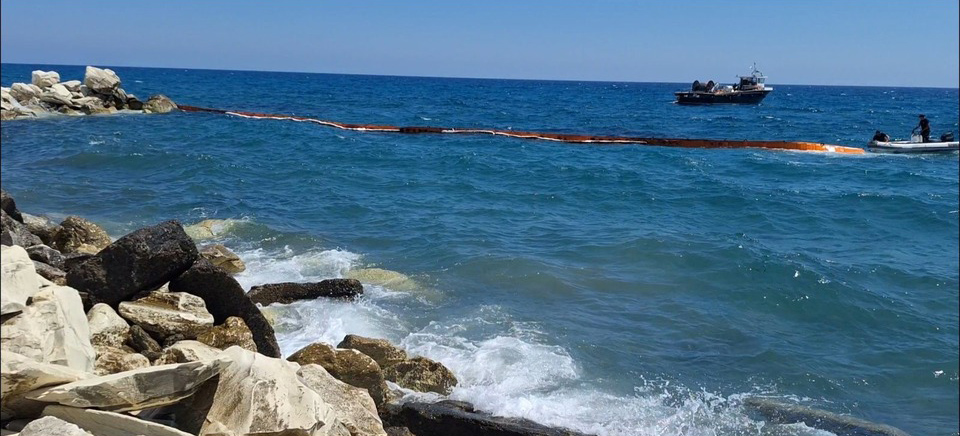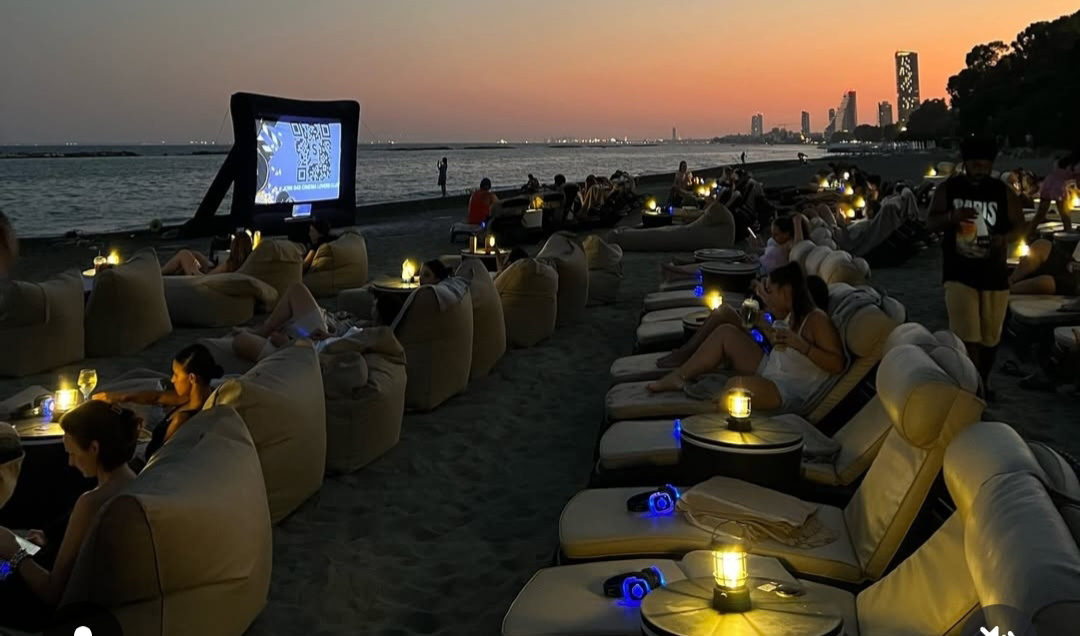Public frustration mounts over Limassol oil leak and beach row
A recent oil spill off the coast of Limassol has triggered mounting concern among residents and swimmers, many of whom say the sea remained polluted for days despite official statements declaring the waters safe.
The incident, confirmed by authorities to have begun on Saturday, July 12, occurred when a disused subsea pipeline near the Moni seaport ruptured, releasing oil into the sea and reportedly damaging a nearby electricity supply line.
The Cyprus ports authority (CPA) said in a public statement that the fisheries department detected the spill early on and took immediate action, supported by a licensed private contractor.
“CPA immediately implemented an environmental management protocol,” said CPA general manager Anthimos Christodoulides, “having assigned a licensed company to carry out the necessary pollution prevention and containment measures.”
Floating booms were deployed to contain the slick, and the CPA said it had begun the process of contacting the pipeline’s owner to ensure full accountability and dismantling of the pipe.
Yet residents insist pollution was visible well before the official announcement was made, with many saying they began submitting complaints nearly two weeks earlier.
Maria, a resident of Ayios Tychonas, wrote to the Sunday Mail describing what they saw on the morning of July 12:
“The sea near the Mediterranean hotel was covered in a dirty, oily brown film, giving off an unpleasant odour.”
Another resident, Pavlos who swam near the Four Seasons hotel that same morning reported: “Brown waste-like slicks, patches of oil, and thick white foam floating visibly on the water. Lifeguards said it’s becoming more frequent and believe it’s coming from ships entering port.”
Despite these observations, the CPA only issued a public statement on July 14 with Christodoulides explaining the priority had been to contain the leak.
“Once we had a clear picture, we proceeded with informing the public.”
He insisted the leak was isolated and due to long-term corrosion.
“At this stage, there is no indication of oil pollution originating from any vessels,” he stressed.

However, mayor of Amathounta Kyriacos Xydias, whose municipality includes Ayios Tychonas, took a more urgent tone.
“I told the CPA, if you are going to make a statement today, the proper state authorities must intervene immediately. First, the matter must not be repeated, and secondly, the matter must be cleaned up.”
He added that the municipality regularly coordinates with both deputy ministry of shipping and the ministry of the interior on sea pollution.
“Every year, we organise a meeting to coordinate. We do not have a contract with the ministry of the interior. We just pay the fee. And, in fact, we force them to take measures.”
Pressed on whether the sea was now safe for swimming, Xydias replied cautiously.
“I think that tomorrow it will be fine. But I am not sure if the pollution has been properly cleaned.”
The fisheries department maintains that the spill was “small in scale” and has since been contained. Daily inspections continue along Limassol’s shoreline, with no new signs of oil reported.
But some swimmers remain sceptical, saying the sea still smells of chemicals.
“We keep being told the water’s clean,” Anna, a beachgoer told the Sunday Mail, “but what we’re seeing, and smelling, says otherwise. If lifeguards are raising concerns and swimmers are spotting waste, someone’s got to act. The sea is our island’s biggest asset, we can’t afford to lose public trust in it.”
Mounting concerns over unregulated beach businesses
The oil spill is only part of a wider dispute unfolding along Limassol’s coastline. Residents say unauthorised beach activity has become widespread, with public spaces increasingly occupied by private operators.
In a formal complaint submitted anonymously, one long-term resident described how a beachfront business has taken over a large area of the beach near luxury hotels, allegedly without any visible permits.
“The business occupies public land with sunbeds, temporary structures, food and alcohol sales, shisha, massage services and hosts parties with loud music. This entire zone borders the exclusive Four Seasons hotel,” the complaint read.
It also claims that an illegal pavilion has been built directly on the sand, with waste bins placed on footpaths, and that a Russian-language volleyball school runs early morning training sessions directly in front of residential buildings.
There are also allegations of unlicensed water sports and illegal parking.
The Amathounta mayor confirmed one of the key concerns, the presence of an open-air cinema believed to be operating without a valid permit.
“A permit was illegally given to the open air cinema before I was elected as a mayor,” said Xydias.
“Now, it is a Russian owner, he puts his sunbeds and screen and goes and does it there. My reaction is to call the police every time, but he keeps coming back over and over.”
Senior tourism officer Vakis Loizides from the deputy ministry of tourism told the Sunday Mail that the ministry has no role in licensing beach cinemas.
“There is no active licence issued by the ministry for running open-air cinemas on beaches,” he said.
“It’s actually the first time I’ve come across a case where someone was granted a licence to operate a cinema directly on the beach.”
Loizides added that enforcement in such cases does not lie with the tourism ministry but with a central beach committee, chaired by the involved municipality and composed of representatives from various municipalities.
However, he admitted the laws governing beaches were “complex” and often unclear.
“These matters can take time to resolve,” he said, stating that “public concern grows when aspects of regulation are overlooked.”
Despite the official containment of the oil spill, what remains is a deeper concern, that no single authority is truly accountable for protecting Cyprus’ most precious public spaces: its beaches.
As clean-up efforts continue and investigations unfold, residents say the issue is no longer just about oil, or sunbeds, or permits, it is about restoring order, clarity and trust along Cyprus’ southern shore.
“No one is telling us the full truth,” said Andreas, a Limassol resident.
“And no one is stepping up to take control.”






Click here to change your cookie preferences